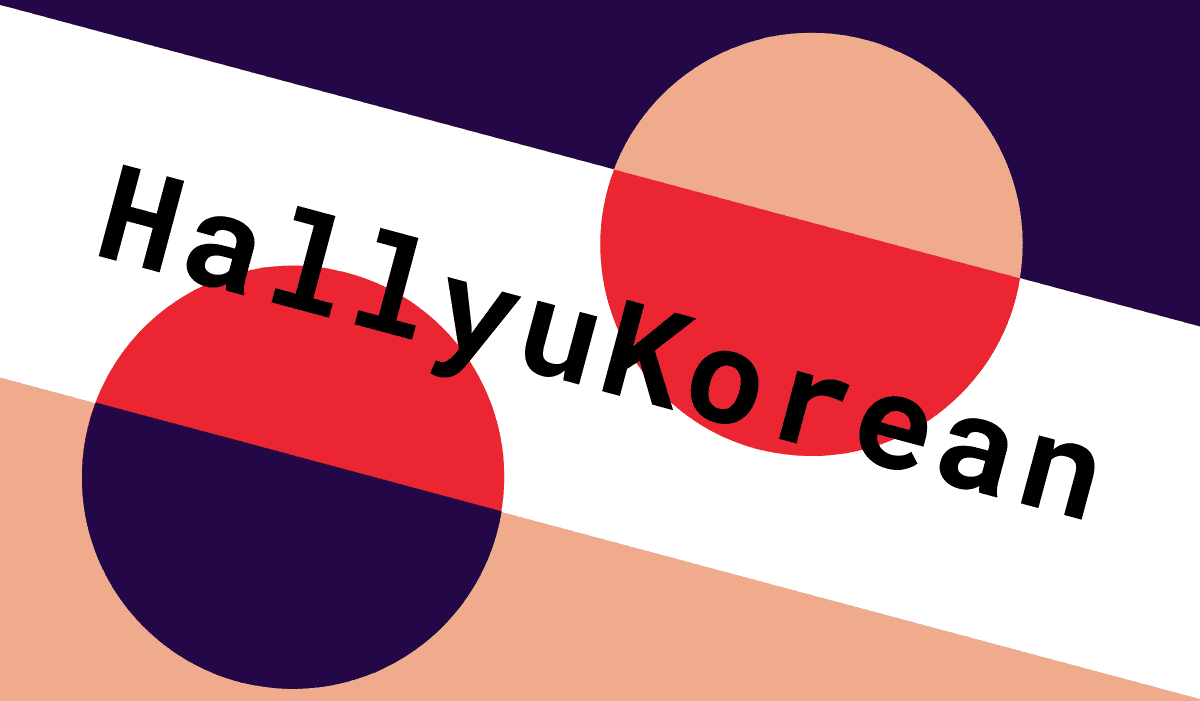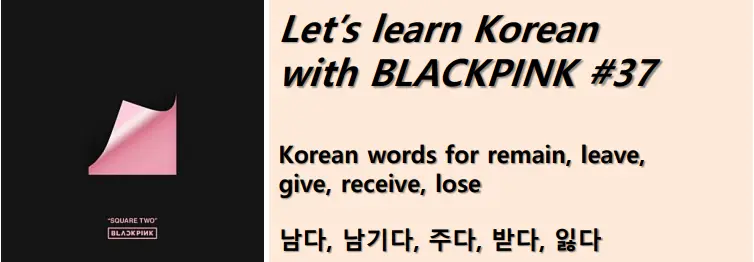Korean words for remain, leave, give, receive, lose : 남다, 남기다, 남겨주다, 주다, 받다, 잃다
Let’s learn Korean words for remain, leave, give, receive, lose with BLACKPINK lyrics.
Click the play button below to listen to all the BLACKPINK lyrics used in this post.
남다 [nam-tta] to reamin, to be left
꽃향기만 남아
kkot-hyang-gi-man na-ma
Nothing left but the scent of a flower
*꽃(flower) + 향기(scent) + 만(only) +
남아(be left)
남기다 [nam-gi-da] to leave
꽃향기만 남기고 갔단다
kkot-hyang-gi-man nam-gi-go gat-dan-da
There was nothing left but the scent of a flower
*꽃(flower) + 향기(scent) + 만(only) +
남기고(남기다(leave) + ~고(and)) +
갔단다(갔다(went) + ~단다))
(*~단다 is used to tell the listener something the speaker knows from hearing it from someone else.)
남겨주다 [nam-gyeo-ju-da] to leave
For you 난 아파도 좋아. 함께하는 동안 너에게 상처만 남겨준 나니까
For you nan a-pa-do jo-a. ham-kke-ha-neun dong-an neo-e-ge sang-cheo-man nam-gyeo-jun na-ni-kka
For you, I’m okay with being hurt. Cause when we were together, all I did was scar you
*For you +
난(나(I) + 는(topic particle), =난) +
아파도(아프다(be sick + 아/어도(even if)) +
좋아(be okay) +
함께하는(함께(together) + 하다(do) + 는(noun modifier)) +
동안(during) +
너(you) + 에게(to) +
상처(wound) + 만(only) +
남겨준(남기다(leave) + ~어주다(do for) + ㄴ(noun modifier)) +
나(I) + 니까(because)
(*~아/어/해 주다 indicates that an action is being done for someone.)
주다 [ju-da] to give
내 마음 다 줬지만 no
nae ma-eum da jwot-ji-man no
I gave you all my heart, but no
*내(나(I) + 의(of), =내) +
마음(heart) +
다(all) +
줬지만(주다(give) + 었다(past tense) + ~지만(but)) +
no
받다 [bat-tta] to receive, to get
가서 오디션을 봤고 나중에 전화를 받았어요
ga-seo o-di-syeo-neul bwat-go na-jung-e jeo-nwa-reul ba-da-sseo-yo
I went and auditioned and got a call later
가서(가다(go) + ~아서(and)) +
오디션(audition) + 을(object particle) +
봤고(보다(see) + 았다(past tense) + ~고(and)) +
나중에(later) +
전화(phone, call) + 를(object particle) +
받았어요(받다(receive) + 았어요(past tense))
(*보다 usually means to see, but ‘오디션을 보다’ means to do an audition. ‘시험을 보다[치다]’ means to take an exam.)
잃다 [il-ta] to lose
잃을 건 없잖아
il-heul geon eop-ja-na
There’s nothing to lose
*잃을(잃다(lose) + 을(noun modifier for future tense verb)) +
건(것(thing)+은(topic marker)) +
없잖아 (없다(don’t have) ~잖아(as you know))
(*~잖아(요) reminds the listener of something or rebukes the listener indirectly.
~잖아(요) is the same as ‘as you know’, ‘didn’t I say that~’ in English.)
Grammar Reference
*Tense
*Present tense : Adjective/verb stem + ~아/어/해요
*Past tense : Adjective/verb stem + ~았/었/했어요
*Future tense : Adjective/verb stem + ~(으)ㄹ 거예요 / ~ㄹ 게요/ ~겠어요
The basic way to get the verb/adjective stem is to remove 다 from the verb/adjective.
If there is a vowel ㅏ or ㅗ on the final syllable of the adjective/verb stem, 아요(present tense), 았어요(past tense), 을 거예요(future tense) is used.
If there is a vowel other than ㅏ or ㅗ on the final syllable of the adjective/verb, 어요(present tense), 었어요(past tense), ㄹ 거예요(future tense) is used.
Also, if there is 하다 in the adjective/verb, 하다 changes to 해요(present tense), 했어요(past tense), 할 거예요(future tense).
Below you can see the conjugation of 남다, 남기다, 남겨주다, 주다, 받다, 잃다 by tenses.
| Present tense | Past tense | Future tense | |
| 남다 | 남아요 | 남았어요 | 남을 거예요 |
| 남기다 | 남겨요 | 남겼어요 | 남길 거예요 |
| 남겨주다 | 남겨줘요 | 남겨줬어요 | 남겨줄 거예요 |
| 주다 | 줘요 | 줬어요 | 줄 거예요 |
| 받다 | 받아요 | 받았어요 | 받을 거예요 |
| 잃다 | 잃어요 | 잃었어요 | 잃을 거예요 |
*Speech levels
The three most commonly used Korean speech levels are 합쇼체 (formal polite), 해요체 (informal polite) and 해체 (informal plain).
*The formal polite style : Adjective/verb stem + ~(스)ㅂ니다
~(스)ㅂ니다 is used more in formal or public situations including the military, news, reporting presentations, meetings and lectures. It’s mainly used to address large gatherings or people you don’t know personally.
*The informal polite style : Adjective/verb stem + ~아/어/해요
~아/어/해요 is most commonly used in everyday life. Compared to the formal polite style, the informal polite style is softer and less formal, so it is mainly used among family members, friends, shopkeepers and other close acquaintances.
*The informal plain style : Adjective/verb stem + ~아/어/해
As for the informal plain style ~아/어/해, it is mainly used among friends from superiors to people of lower rank and among family members.
Below you can see the conjugation of 남다, 남기다, 남겨주다, 주다, 받다, 잃다 by speech levels.
| Formal polite | Informal polite | Informal plain | |
| 남다 | 남습니다 | 남아요 | 남아 |
| 남기다 | 남깁니다 | 남겨요 | 남겨 |
| 남겨주다 | 남겨줍니다 | 남겨줘요 | 남겨줘 |
| 주다 | 줍니다 | 줘요 | 줘 |
| 받다 | 받습니다 | 받아요 | 받아 |
| 잃다 | 잃습니다 | 잃어요 | 잃어 |
BLACKPINK music video to enjoy
Well done for making it this far.
Watch the 꽃(FLOWER) music video above and see if you can hear “꽃향기만 남기고 갔단다”, which you learned today.


